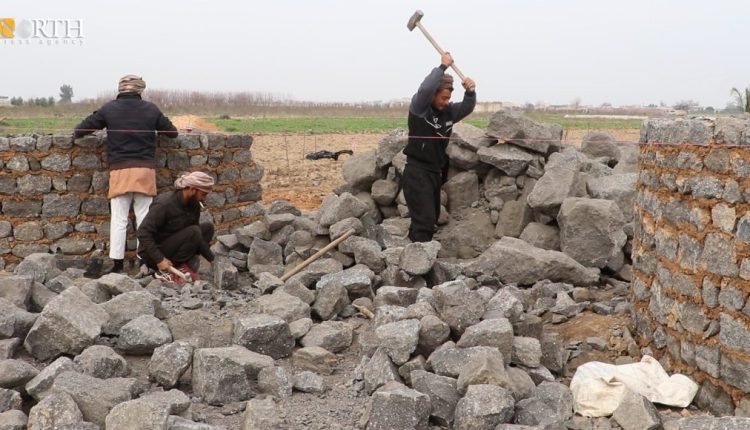
By Zana al-Ali
RAQQA, Syria (North Press) – Muhammad al-Abdullah, a skilled worker in breaking the basalt rock, wakes up every day at 6 am, preparing for a long day of hard work.
Al-Abdullah, 39, a resident of the village of Hamra Blasm, east of Raqqa Governorate, north Syria, works along with a team of 13 workers in the construction of walls and houses using basalt rocks.
Basalt rocks are widely available in Raqqa, making them a valuable resource for construction purposes such as house and fence building. The people of this area have been working in this profession for generations, with al-Abdullah’s fathers and ancestors practicing it as well.
Al-Abdullah works approximately ten hours a day, from 7 am to 6 pm, crushing basalt rocks and using them to construct walls and residential houses, enduring physically demanding tasks throughout the day.
With traditional tools, such as chisels, hammers, and wedges, al-Abdullah breaks the rocks, which require significant manual effort to achieve the desired results.
Despite the difficulty of the work, many young men in Raqqa choose to pursue this profession due to challenging living conditions, soaring prices, and limited job opportunities.
Work challenges
Starting early in the morning and working until late in the evening, al-Abdullah and his coworkers endure physical exertion, leading to fatigue and exhaustion.
He mentioned that they are paid 30,000 Syrian pounds ($2) for building each meter, which is a meager amount considering the long hours of work needed for the task.
“We start work early in the morning, enduring extreme weather conditions, and receive low wages that barely cover our daily expenses,” he told North Press.
Ibrahim al-Hamid, 50, from Hamra Blasem, has been working in breaking basalt rocks for over 30 years, following in the footsteps of his father and other family members.
He told North Press “We are a team of 13 workers, all from the same family. We work together in a workshop, with one group breaking the rocks and another preparing the mortar. I supervise the work progress.”
Every day, al-Hamid and his team complete the construction of 15 to 20 meters, earning approximately 450,000 SYP ($30) for their work.
“We divide the amount among the 13 of us. It is a small sum considering the significant effort we put in. The wages are very low,” he told North Press.
The workers involved in breaking basalt rocks face marginalization and lack support from official sources. Moreover, they do not have any form of health insurance to cover the numerous work-related injuries they experience.
Al-Hamid noted that the workers often sustain injuries while breaking rocks, forcing them to take several days off from work, which affects their livelihood.
He further explained that organizations and the Autonomous Administration in North and East Syria (AANES) provide support to the agricultural and industrial sectors, while the workers who break basalt rocks are marginalized and receive no support.
He called on the relevant authorities to support them and provide them with healthcare, food assistance, and necessary machinery.
